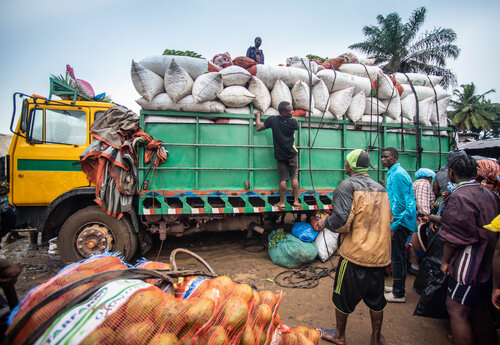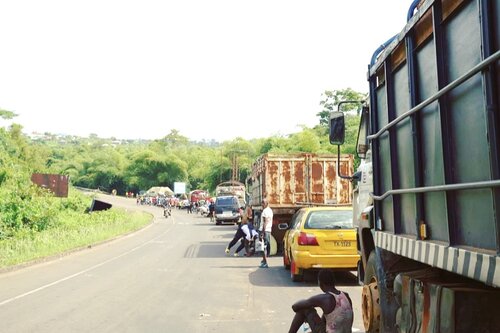
Closed borders can be an opportunity: A farmers’ cooperative achieved record cocoa sales during Ebola
January 9, 2024
How COVID-19 is disrupting Liberia’s vegetable production and supply networks
January 9, 2024How should Liberia’s businesses adapt to manage COVID-19 and the economic ramifications?
Africa’s Pulse report estimates that economic growth in sub-Saharan Africa will decline from 2.4% in 2019 to between -2.1% and -5.1% in 2020. Restrictions on movement and operations alongside the growing global economic fallout owed to COVID-19, will have an impact on Liberia’s businesses.
In the coming months, GROW Liberia will be providing guidance and advice for businesses and farmers to help them to continue operations and production safely. To start, we offer four high level considerations for businesses – recognizing that each business will need to assess their unique circumstances and develop a strategy accordingly.
How should Liberia’s businesses adapt to manage COVID-19 and the economic ramifications?
- Workforce
It is important that businesses prioritize the protection of their workforce amidst COVID-19. Ensuring the continuation of employment in a safe working environment includes:
- Establish a remote working strategy where possible, including halting work or shifting to working from home. Address your businesses’ information technology and communications infrastructure to support remote work where necessary. This may mean new scratch card allowances for staff members, for example. Or, reimbursements for generator costs.
- Ensure the health and safety of your workforce.
- Provide protective equipment, such as masks and gloves for employees who should report to work.
- Rethink physical work management, such as employee spacing, flow of office or shop traffic, and frequency of cleaning highly trafficked spaces.
- Update HR policies, travel rules, and first-aid plans. Track exactly where staff are and how many of them are in affected or vulnerable communities.
- Define clear policies for absence due to sickness or caring for relatives, the procedure for reporting illness, etc. Continuously refresh and update these policies as circumstances evolve.
2. Finance and Liquidity
Reduced customers, sales and trade combined with higher costs for inputs like transport will put financial pressure on Liberia’s businesses.
- Ensure sufficient cash on hand. Businesses must navigate payroll, maintain inventory or respond to changes in demand. Establish tighter controls over cash and bring in cash-related key performance indicators (KPIs) to reduce leakage.
- Prepare options to increase cash and/or reduce costs. Businesses should prepare by exploring and testing their capital access and cost reduction options.
- Review compensation model for cost-saving opportunities without negatively impacting employee perceived value.
- Draw down on credit lines and seek to restructure existing terms and conditions.
- Manage communications and interactions with relevant stakeholders (lenders, suppliers, landlords and tax authorities). For example, build facility headroom or incremental financing.
- Rapidly explore alternative financing options/ restructuring plans with investors/ financiers
3. Customer Engagement
It is imperative to ‘stay close” to customers and make an effort to keep customers engaged and reassured.
- Provide a safe experience. Businesses should identify changes in key policies to ensure safety, ranging from product handling guidelines to workplace social distancing. Businesses may also consider alternative sales and distribution channels. For example, Lib Delivery, Meals & Deals on Wheels, Cookshop Biz etc. can deliver right to the door of customers. Then, communicate these clearly to customers.
- Incentivize your customers. Discounts and special offers will help to incentivize current customers to stay with your business. You may also consider rent waivers or cancellation of performance fees.
- Prepare for the future. For longer-term stability, firms should start assessing and targeting other market segments and identify opportunities for growth. Thinking through longer-term considerations around shifts in core markets or business models as a result of the pandemic
4. Supply Chain Management
Liberia’s businesses should expect disruptions in supply chains; regular suppliers may not be able to deliver – be it goods sourced from within Liberia that are now challenged to move freely or goods that are relying on international movement that is either disrupted or halted for the time being.
- Assess supply risks. Complete a supply chain assessment, mapping the businesses supply sources – and then mapping the sources’ own supply sources. Analyze risks within the chain such as shipping restrictions, supply shortfalls, reduced demand, etc. Adapt stock management and replenishment levels accordingly.
- Source alternatives. Where risks seem high, find alternatives – new suppliers, locally-available alternatives, substitute materials, or alternative manufacturing facilities, for examples.
For more information:
- COVID-19: Impacts to business – PWC
- 7 ways businesses can respond to the coronavirus – World Economic Forum
- Africa’s Pulse – World Bank
- Tackling COVID-19 in Africa – McKinsey
- Seven key actions business can take to mitigate the effects of COVID-19 – Strategy + Business
- Impact of COVID-19 on the Nigerian Consumer and Industrial Markets – KPMG
- COVID-19: A Business Impact Series – KPMG
- How are companies responding to the coronavirus crisis? – World Economic Forum
- Markets in Crises (MiC) Statement on COVID-19 – Seep Network
- Additional useful links
About GROW Liberia
GROW is an agri-business and investment advisory program that partners with businesses, investors, associations, and government agencies to accelerate inclusive economic returns within high growth industries in Liberia. GROW is supporting public and private partners and markets to respond to the COVID-19 emergency. Learn more about our research, advisory, and support here.
GROW Liberia © 2021 All rights reserved




